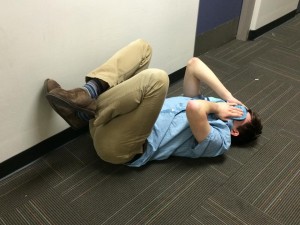
We’re just out of fall break at Pomona College, which means that we’re fresh out of the never-ending stream of midterms, papers, and lab reports that nearly every student swims in during Weeks 5-7. As you would expect, this deluge of responsibilities inevitably causes a bit of drowning each time it comes around. Fortunately for you, your lovely neighborhood blogger is here to help forecast the next impending tsunami, so you have at least some time to prepare your lifeboat and appropriate emergency rations for riding out the flood! I’ve also prepared some handy tips that you can use to help save a life.
But first, a fun tangent. Truthfully, this post has been in the works for the past three-ish weeks, but in an ironic twist I couldn’t possibly make up, I forgot to put on my life vest while navigating the sea of assignments. On the bright side, as I have just narrowly survived my life falling apart, the warning signs are fresh in my memory. Thus, I present to you:
5 Ways to Tell If Your Life Is Falling Apart
(And What You Can Do About It)
1. You start getting sick.
I’ve put this one at the top of the list because it’s probably the easiest to recognize, but also the most frequently ignored. People get sick all the time – a constant reminder of the irritating limitations of the human body. During midterm season, your body getting sick is probably its way of telling you, “Dude, I’m rebelling against you because you’ve treated me badly. Things better change. Soon.”
What to do: If you’ve started getting sick, chances are it’s too late to stop the virus. The best you can do is treat yourself better by sleeping enough, eating proper meals, and getting some exercise. If things get really bad, contact your professor about possible assignment extensions and consider skipping a day or two of classes. One day of focused recovery is much better than a month of being sick.
2. You’re skipping meals because you need more time to work/study.
You might be like me in thinking that sitting down for a meal is a waste of time when you have two papers to write. Or you might be so invested in the studying you’re doing right now that you don’t want to pry yourself from that comfy seat and haul your body to a dining hall. Maybe you even brought a candy bar with you to your study space of choice because you once heard from your mom that skipping meals is bad, and hey, you’re willing to compromise.
What to do: Listen to your mother! Skipping meals is bad, and going to eat isn’t a waste of time. You’ll work better once you have food in your stomach. If you’re really that busy, consider getting a green box. They’re available in the dining halls (for a low cost that they’ll refund in flex at the end of the semester), reusable, and enable you to take dining hall food to wherever you need to go.
3. You tell yourself that you just need an hour power nap, and then you’ll be ready to wake up at 3AM and continue working.

This is very closely tied to #2, because once you start thinking that eating isn’t worth your time, sleep is probably the next thing to go (or, depending on who you are, it’s already gone). In this scenario, you’ve already resigned yourself to pulling an all-nighter simply because you just have to finish that assignment for tomorrow. Maybe you think you’re being nice to yourself and your body by budgeting in that time for a nice nap, but at this point, you’re just rationalizing.
What to do: If you are having this exact thought as you’re reading this, because it’s 2AM and your life has fallen apart, stop reading and go to sleep. Any work you do now probably isn’t going to be up to your standards, and with so little sleep, you’re not going to be able to pay attention in any of your classes tomorrow. For people reading this as a cautionary tale, always remember to budget time to sleep when planning your schedule, and always remember to leave more time for an assignment than you think you’ll need. It’s easy for us as young people to forget that our bodies need sleep, but this isn’t a lesson you want to learn the hard way.
4. You try to squeeze reading into the walk between classes.

Even I can’t tell if I’m being completely serious with this one. I’ll be honest, it’s a thought I’ve had, but never one I’ve seriously considered. Still, if you’re so pressed for time that you’re thinking about squeezing every last minute out of your waking hours, you probably need some sort of time management intervention. (Read: I probably some sort of time management intervention.)
What to do: Give it up. I don’t mean giving up trying to get all of your work done, but I do mean that the five minute walk between classes is not going to be the time to figure out how Yuko Otsuka’s theory of verb-initial languages might apply to a minority language in Kenya. (Side note: future post on linguistics by yours truly coming soon to a computer near you!) Take the walk between classes to appreciate the beauty of college in Southern California and wave to all your friends walking past you. Give yourself time to be with your own thoughts and not be a constant reading machine.
5. You ask yourself if it’s really worth it getting a college degree.
Big workloads come with big crises. Sitting in bed, zoning in and out as you read and reread Plato, you ask yourself if all these sleepless nights are worth it. Do you really need an education? Why don’t you just quit school and become a monk? What’s the point of it all?
What to do: Tell yourself yes and move on. Chances are that if you’re at Pomona College, or at any college for that matter, at some point in the past you have told yourself that it is worth it. You become a much better person when you really immerse yourself in the opportunities that college provides. Nearly all of the time, that’s going to require your time and hard work. Sure, writing a paper or studying for a midterm is a lot of work, but writing papers and really engaging with your field’s theories is how you learn to think critically. And isn’t that what you came to college for?
